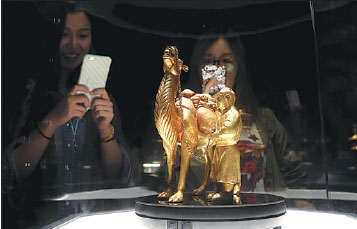Belt, Road 'beyond expectations'
Updated: 2016-09-27 08:02
By Tang Yue In Xi'An(China Daily)
|
|||||||||
|
Visitors take photos on Monday of one of the relics of ancient civilizations along the Silk Road on display in Beijing's Badachu Park. Jiang Dong / China Daily |
Quick development paves way for strengthening initiative, official says
The development of the Belt and Road Initiative has exceeded expectations, and China is more determined to strengthen the initiative, China's top publicity official said on Monday.
"Since the proposal of the initiative in 2013, the development has been fast and comprehensive. The speed and the achievement are beyond expectations," Liu Qibao, a member of the Political Bureau of the Communist Party of China Central Committee and head of the committee's publicity department, said at the opening of the International Seminar on the Belt and Road Initiative in Xi'an, Shaanxi province.
The initiative, proposed by President Xi Jinping in autumn 2013 during his visits to Central and Southeast Asia, aims to promote closer economic cooperation along the route and make global economic governance more open.
By the end of June, more than 30 countries along the Belt and Road routes had signed cooperation agreements with China. Beijing is also working with more than 20 countries on capacity-building projects in the manufacturing sector, according to a report by Renmin University of China that was released at the seminar.
"The Belt and Road Initiative is not a 21st-century Marshall Plan," said Charles Onunaiju, director of the Centre for China Studies in Nigeria, referring to the United States' post-World War II economic support for rebuilding Western Europe.
"The Belt and Road Initiative is not solely led by China and does not serve its own interests. Instead, it has always been an open and inclusive process."
Liu said that after three years, the framework of the initiative is clear and China will work on more detailed and sustainable cooperation.
Liu Wei, president of Renmin University of China and a professor of economics, added that a more elaborate definition of the initiative will help further strengthen the community.
"Meanwhile, a few successful projects in the initial stage are very crucial. Countries will be more committed to the initiative after they benefit from the programs."
Among the major achievements, the Asian Infrastructure Investment Bank was founded in December, with its headquarters in Beijing and authorized capital of $100 billion. It already has approved investment of $509 million for its first four projects in Bangladesh, Indonesia, Pakistan and Tajikistan.
In addition to the economic and financial cooperation, Liu Qibao also emphasized the importance of cultural exchanges with participating countries.
He said China expects to continue expanding cooperation in culture, tourism, media, sports and archaeology.
For example, the Chinese central government now offers about 10,000 government scholarships a year to students in countries along the route, according to the Renmin University report.
Today's Top News
Renminbi use surges in London in spite of Brexit
The meeting of Two Pagodas in Kew Gardens
Kids in tow, Prince William starts Canadian tour
Dancing and drinking during Munich Oktoberfest
ODI led for first time by private firms
Nanjing's culture and creativity on display in London
State of emergency declared in US city amid protests
Universities given boost in rankings
Hot Topics
Lunar probe , China growth forecasts, Emission rules get tougher, China seen through 'colored lens', International board,
Editor's Picks

|

|

|

|

|

|








